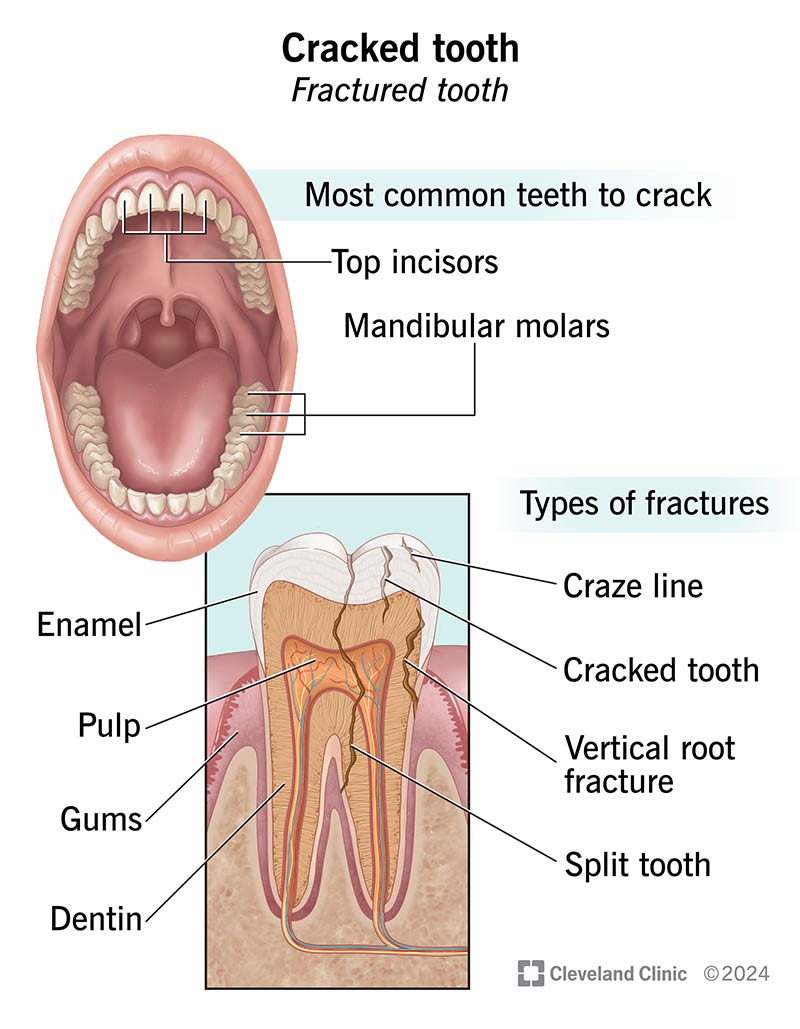A cracked or fractured tooth may happen because you grind your teeth, injure a tooth or because you’re getting older. A cracked tooth may cause symptoms like pain and swelling. Your tooth may feel sensitive to changes in temperature. Your dentist has several ways to treat a cracked tooth. Treatment depends on where the crack’s location and severity.
Advertisement
Cleveland Clinic is a non-profit academic medical center. Advertising on our site helps support our mission. We do not endorse non-Cleveland Clinic products or services. Policy

Image content: This image is available to view online.
View image online (https://my.clevelandclinic.org/-/scassets/Images/org/health/articles/cracked-tooth-types)
A cracked tooth is when something damages your tooth and causes a small break (crack or fracture) in it. The crack may be small enough that it doesn’t affect your tooth. Other times, your tooth may break in pieces or split. A badly cracked tooth may be a dental emergency.
Advertisement
Cleveland Clinic is a non-profit academic medical center. Advertising on our site helps support our mission. We do not endorse non-Cleveland Clinic products or services. Policy
While you can have a crack in any of your teeth, cracks happen most often in your upper front teeth and the teeth in the back of your lower jaw (mandibular molars). Other names for a cracked tooth are cracked tooth syndrome (CTS) and fractured tooth. There are several parts to your teeth, and you can have a crack in all of those parts.
Your dentist will classify your tooth fracture as one of the following five categories:
It can be. For example, a crack in your tooth opens the door for bacteria to seep into your tooth pulp and cause a tooth abscess. Left untreated, a tooth abscess may spread to your jawbone. It may also spread to your facial muscles, tendons and fat cells in your face and neck.
Advertisement
Cracked teeth don’t always cause symptoms. When they do, the main symptoms include:
Without treatment, a cracked tooth may lead to an infection (tooth abscess) that may cause serious health issues. Tooth abscess symptoms are:
The most common causes of cracked teeth are:
To diagnose a fractured tooth, a dentist will ask about your symptoms and possible causes. Next, they’ll:
Your dentist may refer you to an endodontist (root canal specialist) for more or different treatment. An endodontist is a dental specialist who focuses on treating issues with dental pulp and roots.
Cracked tooth treatment depends on how much damage your tooth has. Common cracked tooth treatments include:
Advertisement
Repairing your broken tooth may take weeks or months depending on your treatment. Your dentist or endodontist will explain the repair process, so you know what to expect. For example:
No, you may not need treatment if you have a cracked tooth that doesn’t cause infection, cause pain or extend very deep or far into your tooth, like a hairline crack. You should always talk to a dentist if you have symptoms or notice there’s a crack in one of your teeth.
No, you can’t. You should always talk to a dentist if you suspect you have a cracked tooth. But there are ways to ease your symptoms before your appointment:
With prompt treatment, repaired teeth can last for years and not cause any other issues. But even with treatment, tooth cracks sometimes continue to get bigger or split. This can result in tooth loss at some point.
Advertisement
While you may not always be able to prevent a cracked tooth, there are steps you can take to reduce the chances you’ll have one:
Give your dentist a call if you have symptoms of a cracked tooth, like a toothache, or if your tooth hurts when you bite down on it while chewing. Early diagnosis and treatment may help you avoid more serious issues like infection.
No, a cracked tooth can’t heal, but treatment might save your tooth. Getting your fractured tooth repaired quickly can lessen your risk of more damage and infection.
There are many ways to crack a tooth: crunching a popcorn kernel or peppermint stick, chomping down on crushed ice or grinding your teeth. But visiting your dentist is the only way to reduce the chance that your cracked tooth doesn’t become a serious health issue. They’ll examine your tooth for signs of damage and recommend treatment. They’ll also recommend ways for you to keep your teeth from cracking.
Advertisement

Sign up for our Health Essentials emails for expert guidance on nutrition, fitness, sleep, skin care and more.
Learn more about the Health Library and our editorial process.
Cleveland Clinic’s health articles are based on evidence-backed information and review by medical professionals to ensure accuracy, reliability and up-to-date clinical standards.
Cleveland Clinic’s health articles are based on evidence-backed information and review by medical professionals to ensure accuracy, reliability and up-to-date clinical standards.
Dentistry plays an important role in oral health. Cleveland Clinic’s experts can design a personalized plan that will keep you smiling for the long haul.
